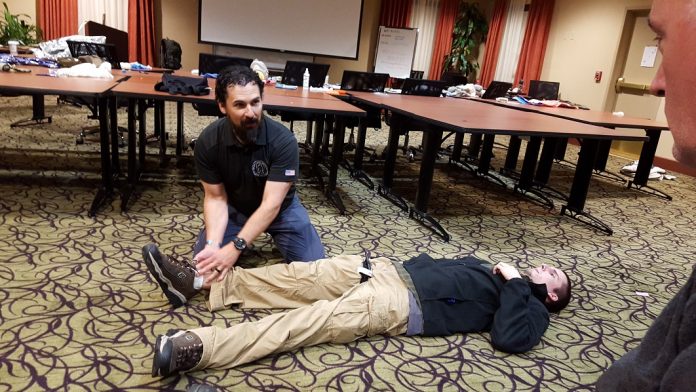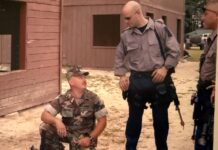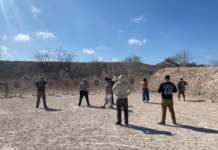
By: Kerry “Pocket Doc” Davis, Owner Dark Angel Medical LLC., – MASF Member
Trauma happens at the speed of life, meaning that how quickly you react to that specific trauma can have a definite impact on the overall survivability of you or the person you’re rendering aid to. We have a simple question we ask students in all of our classes when we talk about controlling life-threatening hemorrhage; “How long do you have to stop the bleeding if you’re injured?” The answer, while it may seem like a simple one, really isn’t all that simple. The answer; “The rest of your life”.
 In the pre-hospital emergency medical service world, we’ve had a term that we’ve used for a long time. We like to call it “The Golden Hour”. This oft-used term is related to the importance of getting a trauma victim to definitive, advanced care within 60 minutes of the injury with the timer starting at the moment of injury. There are many factors which will play a part in this; the road conditions, the flight conditions if aero-medical evacuation is needed, the capability of the crew, the distance to the facility and, most importantly, the injuries received. One of the most important aspects of this “Golden Hour” is the very beginning. It’s the first 10 minutes post-injury that may tell the tale. We like to call it “The Platinum 10”.
In the pre-hospital emergency medical service world, we’ve had a term that we’ve used for a long time. We like to call it “The Golden Hour”. This oft-used term is related to the importance of getting a trauma victim to definitive, advanced care within 60 minutes of the injury with the timer starting at the moment of injury. There are many factors which will play a part in this; the road conditions, the flight conditions if aero-medical evacuation is needed, the capability of the crew, the distance to the facility and, most importantly, the injuries received. One of the most important aspects of this “Golden Hour” is the very beginning. It’s the first 10 minutes post-injury that may tell the tale. We like to call it “The Platinum 10”.
Why the first 10 minutes? Look around the nation and the average EMS response time is right at 10 minutes as well as that of law enforcement. So, if law enforcement and EMS isn’t there in that first 10 minutes post-injury, who is? Look in the mirror and point two thumbs at yourself. You, the bystander, are “It” until they, law enforcement or EMS, arrive. So, in that first 10 minutes after that devastating accident you witnessed, you will be the one applying the tourniquet, packing the hemostatic gauze, wrapping the pressure bandage, offering comfort and trying the best you can to keep them alive. That’s a pretty tall order, isn’t it? It’s no wonder why more people don’t take medical classes. Literally holding someone’s life in your hands is a huge responsibility.
 Now break it down to the shooting range level. How far away from EMS or definitive care are many ranges? Does your range have a medical plan? Does your range have trauma kits (not band aids and expired antibiotic ointment)? Does your range have well-trained RSO’s who carry a blowout kit on their person? By well-trained, I mean more advanced medical training that basic first aid?
Now break it down to the shooting range level. How far away from EMS or definitive care are many ranges? Does your range have a medical plan? Does your range have trauma kits (not band aids and expired antibiotic ointment)? Does your range have well-trained RSO’s who carry a blowout kit on their person? By well-trained, I mean more advanced medical training that basic first aid?
Take a look around the next time you’re at a range and see how many people, range personnel included, have some sort of blowout kit on them. It’s almost a certainty that there will be less of those on the line. Why don’t more people have them? Lack of prioritization? Lack of education on the importance of having one? Whatever the case may be, it’s got to change because we live in an inherently dangerous world and the time chooses us. When it does, we have to be ready from a training, equipment and mindset standpoint.
So, why is that first 10 minutes post-injury so important? Let’s take a look at it from a clinical perspective and you’ll get a little bit of the “why” you not only need a med kit, but “why” you need the training on how to properly employ said kit. It goes a little something like this: You will circulate your entire volume of blood in around a minute and the average adult has around 5 liters of blood. If your femoral artery is dissected, you can lose over a liter of blood within the first minute. 1 minute.
and you’ll get a little bit of the “why” you not only need a med kit, but “why” you need the training on how to properly employ said kit. It goes a little something like this: You will circulate your entire volume of blood in around a minute and the average adult has around 5 liters of blood. If your femoral artery is dissected, you can lose over a liter of blood within the first minute. 1 minute.
60 seconds.
Let’s break that down. That’s 2 TV commercials.
Bleeding that much is enough to place you into Stage II Hemorrhagic Shock and that can drop your chances of survival down to around 14% (per studies conducted by the United States Army Institute of Surgical Research), so time is of the essence when it comes to hemorrhage control.
In addition to carrying oxygen and removing waste, our blood contains vital clotting factors which aid us in the event of an injury. However, if all of our clotting factors are on the deck, our body’s ability to clot is fragged.
The more blood you lose, the more your body has to compensate to make up for th at loss of oxygen carrying and waste removal capability by increasing respirations and heart rate. Blood loss makes the body “shunt” blood to essential systems, that diversion of blood bypasses our “thermostat”, which makes the body colder, which decreases the blood’s clotting capability (which is already impaired due to losing clotting factors), which makes you bleed more, which decreases oxygen carrying capability, which increases waste buildup, which increases chances of death. It is a very vicious cycle and one that can be avoided by keeping the blood in the body where it belongs; in the body.
at loss of oxygen carrying and waste removal capability by increasing respirations and heart rate. Blood loss makes the body “shunt” blood to essential systems, that diversion of blood bypasses our “thermostat”, which makes the body colder, which decreases the blood’s clotting capability (which is already impaired due to losing clotting factors), which makes you bleed more, which decreases oxygen carrying capability, which increases waste buildup, which increases chances of death. It is a very vicious cycle and one that can be avoided by keeping the blood in the body where it belongs; in the body.
As we said, education (training), obtaining the proper equipment and having the right mindset are the components needed when you have to stop the bleeding quickly. There is no “one” right answer as a response to trauma is very situationally dependent. You may need direct pressure or you may need a tourniquet. There are also hemostatic agents and pressure bandages—The bleeding and situation may dictate what you utilize first. Our Direct Action Response Kit (D.A.R.K.) has the necessary components (pictured below). So, there’s the training and kit, provided by us, and the mindset, provided by you.
 At the end of the day, we need to realize that no matter how much we know and how proficient we are, we won’t be able to save everyone. It doesn’t mean we won’t try like crazy and do everything in our power and with every tool at our disposal, but we need to be able to understand that concept or we will mire ourselves in an ever-deepening pool of second-guessing, guilt and self-loathing. All of that aside, remember, though, whether you do anything or not, all bleeding will eventually stop.
At the end of the day, we need to realize that no matter how much we know and how proficient we are, we won’t be able to save everyone. It doesn’t mean we won’t try like crazy and do everything in our power and with every tool at our disposal, but we need to be able to understand that concept or we will mire ourselves in an ever-deepening pool of second-guessing, guilt and self-loathing. All of that aside, remember, though, whether you do anything or not, all bleeding will eventually stop.
And that, my friends, is a fact!

-Kerry “Pocket Doc” Davis
Founder of Dark Angel Medical, LLC

SOURCE ARTICLE: http://masf.co/2017/02/24/the-platinum-10-the-first-10-minutes-post-injury-and-one-of-the-most-important-aspects-the-golden-hour/



